2009书面表达中的句子结构
图片预览


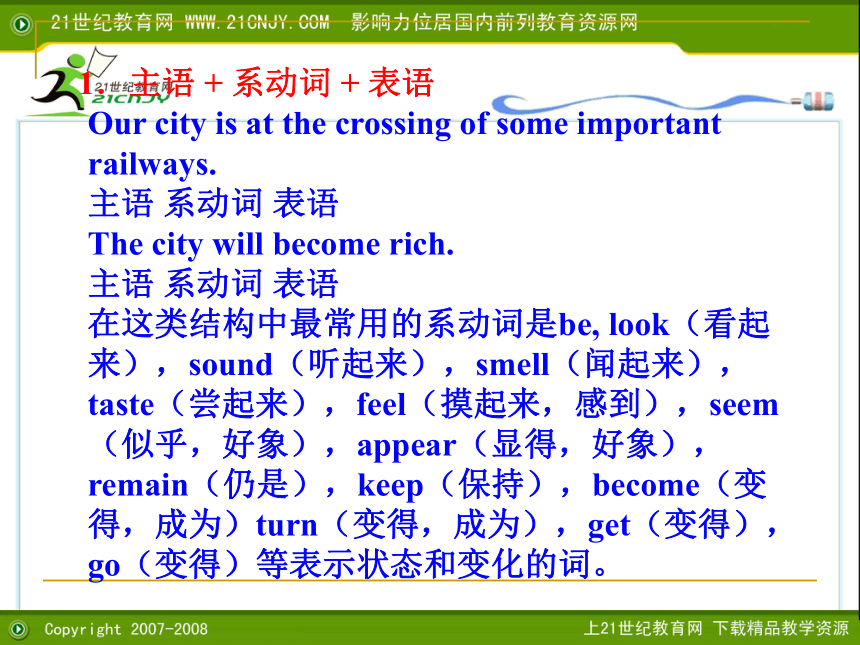
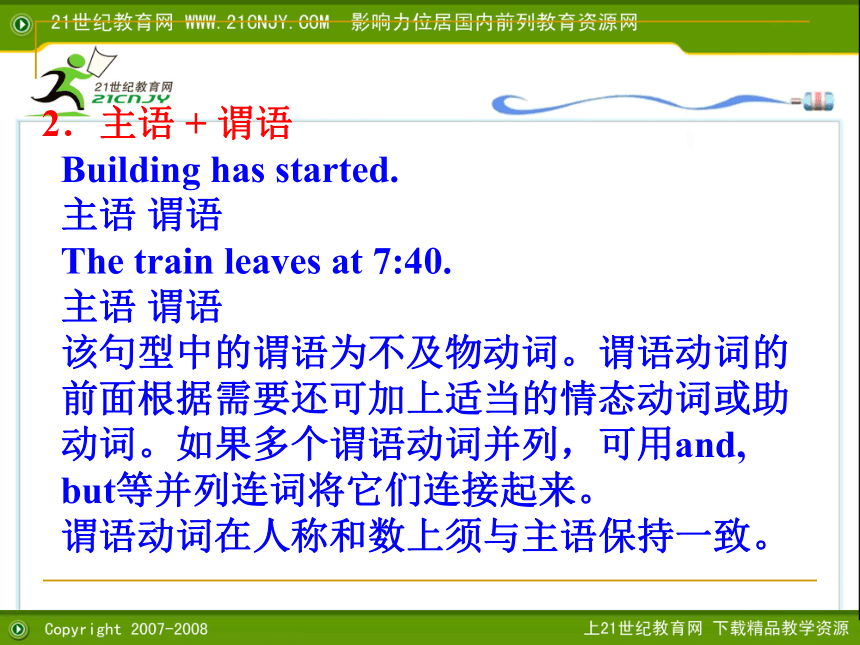
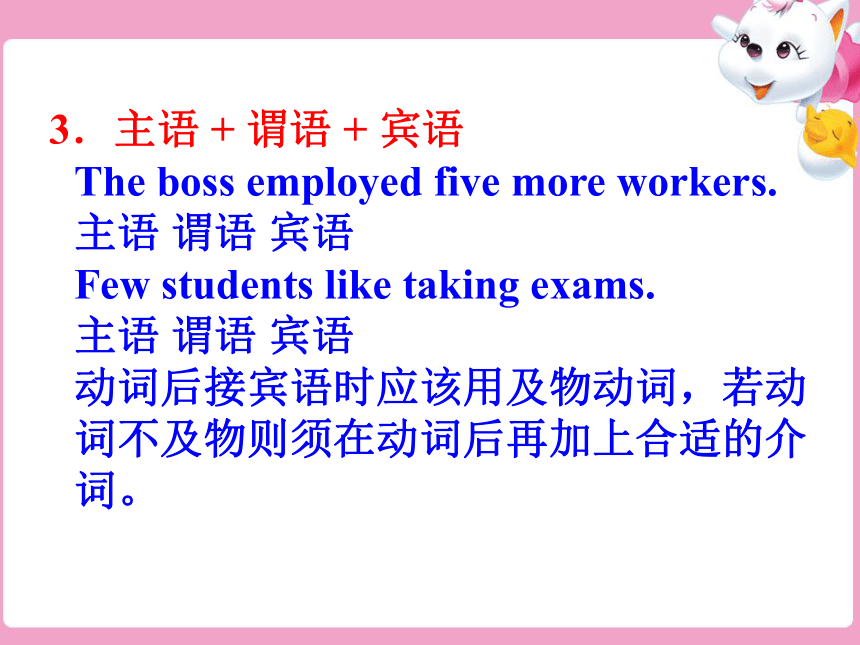

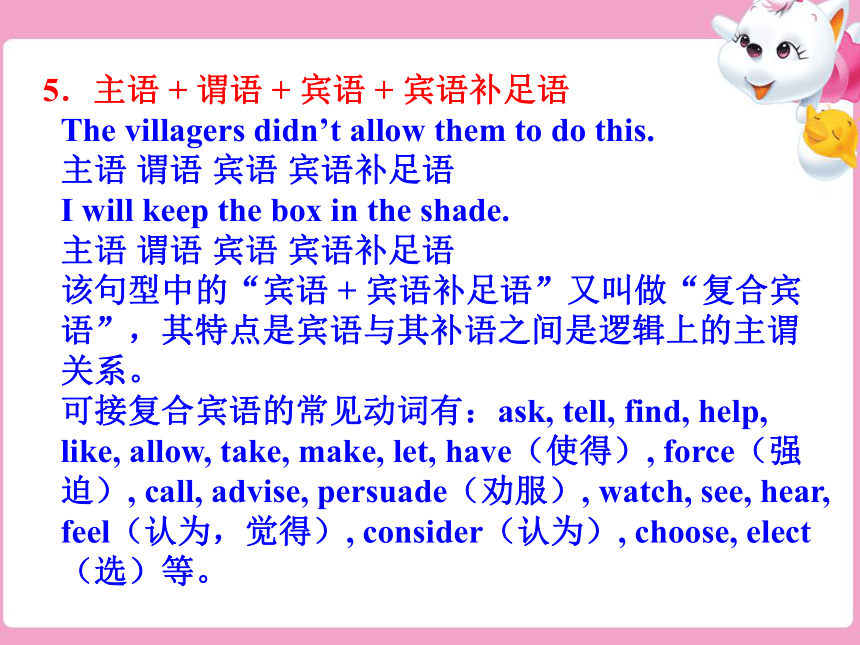

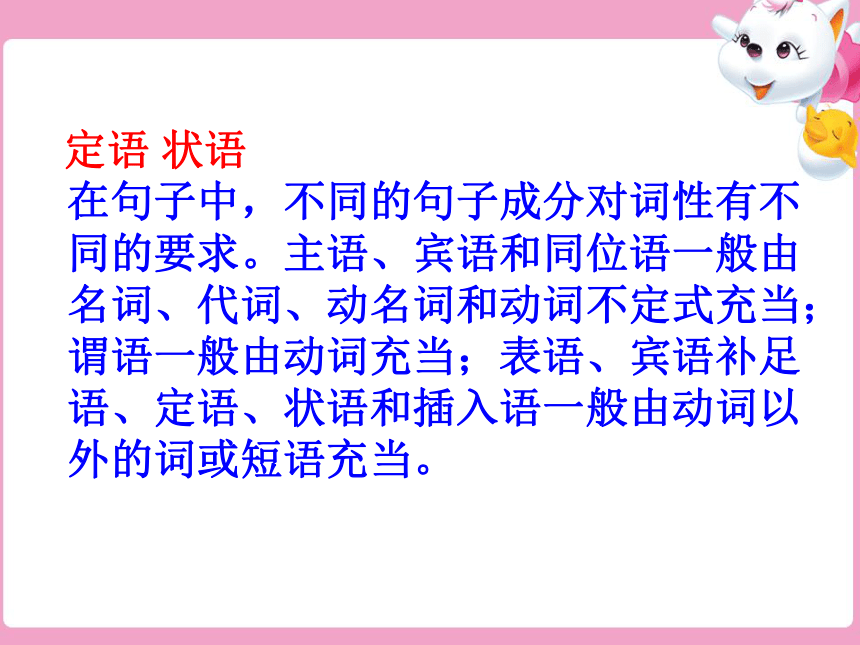

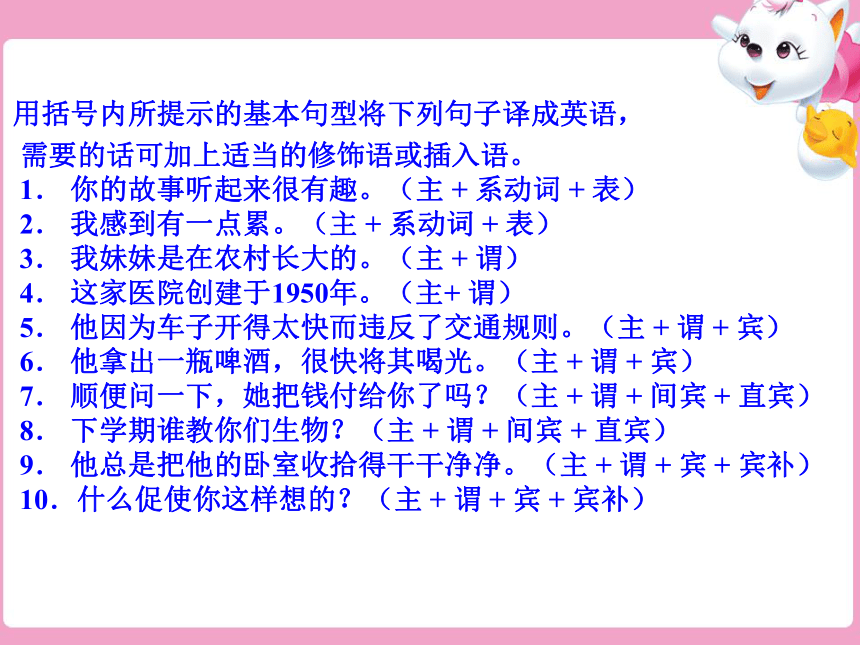
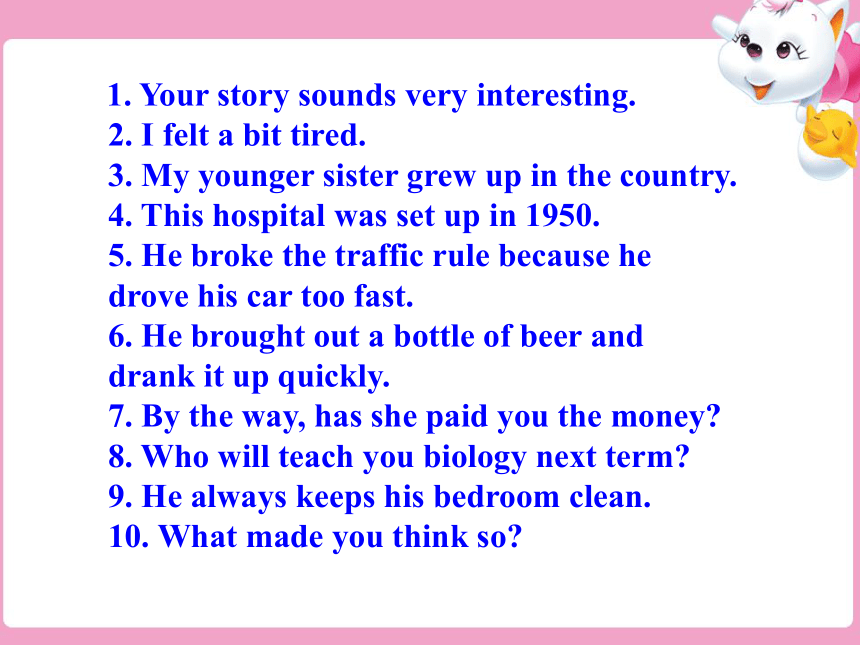
文档简介
课件34张PPT。书面表达中
的句子结构刘轶群英语课堂一、 简单句的五种基本句型
句子用词准确、合乎语法规范是一篇文章最起码的要求。英语句子虽然千变万化,但就一个简单句来说,其基本结构不外乎以下五种: 1.主语 + 系动词 + 表语 Our city is at the crossing of some important railways. 主语 系动词 表语 The city will become rich. 主语 系动词 表语 在这类结构中最常用的系动词是be, look(看起来),sound(听起来),smell(闻起来),taste(尝起来),feel(摸起来,感到),seem(似乎,好象),appear(显得,好象),remain(仍是),keep(保持),become(变得,成为)turn(变得,成为),get(变得),go(变得)等表示状态和变化的词。 2.主语 + 谓语 Building has started. 主语 谓语 The train leaves at 7:40. 主语 谓语 该句型中的谓语为不及物动词。谓语动词的前面根据需要还可加上适当的情态动词或助动词。如果多个谓语动词并列,可用and, but等并列连词将它们连接起来。 谓语动词在人称和数上须与主语保持一致。 3.主语 + 谓语 + 宾语 The boss employed five more workers. 主语 谓语 宾语 Few students like taking exams. 主语 谓语 宾语 动词后接宾语时应该用及物动词,若动词不及物则须在动词后再加上合适的介词。 4.主语 + 谓语 + 间接宾语 + 直接宾语
He has fetched us some new textbooks.主语 谓语
间接宾语 直接宾语A car factory will bring
the province more jobs.主语 谓语 间接宾语 直接
宾语此句型中的及物动词须跟两个宾语,间接宾
语一般指人,直接宾语一般指物。间接宾语可以
放在直接宾语的前面,也可放在直接宾语的后面,
但间接宾语放在后面时需在其前面加上适当的介词。
例:A car factory will bring more jobs to the province.
可接双宾语的常见动词有:ask, answer, give, offer,
send, bring, pass, tell, show, teach, promise等。 5.主语 + 谓语 + 宾语 + 宾语补足语 The villagers didn’t allow them to do this. 主语 谓语 宾语 宾语补足语 I will keep the box in the shade. 主语 谓语 宾语 宾语补足语 该句型中的“宾语 + 宾语补足语”又叫做“复合宾语”,其特点是宾语与其补语之间是逻辑上的主谓关系。 可接复合宾语的常见动词有:ask, tell, find, help, like, allow, take, make, let, have(使得), force(强迫), call, advise, persuade(劝服), watch, see, hear, feel(认为,觉得), consider(认为), choose, elect(选)等。 上面句型中只列出了句子的主要成分,事实上,句子中还常常有定语、状语和同位语等修饰语,有时还有不充当句子成分的插入语等。例: Professor Wang bought a new computer at a high price. 定语 状语 在句子中,不同的句子成分对词性有不同的要求。主语、宾语和同位语一般由名词、代词、动名词和动词不定式充当;谓语一般由动词充当;表语、宾语补足语、定语、状语和插入语一般由动词以外的词或短语充当。 一般来讲,一个句子至少具有一个主语和一个谓语(或系表结构),但在上下文中有时可能会有省略现象。省略后的句子可能会缺少包括主语、谓语在内的一些句子成分。祈使句中的主语按要求也是应该舍去的。例: “Do give her my regards.” “Of course I will.” 第一句是祈使句,动作执行人you已经舍去。第二句是省略句,根据上句I will后省略了give her your regards。 用括号内所提示的基本句型将下列句子译成英语,
需要的话可加上适当的修饰语或插入语。 1. 你的故事听起来很有趣。(主 + 系动词 + 表) 2. 我感到有一点累。(主 + 系动词 + 表) 3. 我妹妹是在农村长大的。(主 + 谓) 4. 这家医院创建于1950年。(主+ 谓) 5. 他因为车子开得太快而违反了交通规则。(主 + 谓 + 宾) 6. 他拿出一瓶啤酒,很快将其喝光。(主 + 谓 + 宾) 7. 顺便问一下,她把钱付给你了吗?(主 + 谓 + 间宾 + 直宾) 8. 下学期谁教你们生物?(主 + 谓 + 间宾 + 直宾) 9. 他总是把他的卧室收拾得干干净净。(主 + 谓 + 宾 + 宾补) 10.什么促使你这样想的?(主 + 谓 + 宾 + 宾补) 1. Your story sounds very interesting. 2. I felt a bit tired. 3. My younger sister grew up in the country. 4. This hospital was set up in 1950. 5. He broke the traffic rule because he drove his car too fast. 6. He brought out a bottle of beer and drank it up quickly. 7. By the way, has she paid you the money? 8. Who will teach you biology next term? 9. He always keeps his bedroom clean. 10. What made you think so? 二、 表达不同功能的常见句式
英语句型丰富多彩,学习、掌握和运用表达不同功能的若干常见句式,有助于我们造出许许多多地道、生动的英语句子。现将中学课本中表达不同功能的常见句式归纳如下: 1.There be句型及其扩展形式 表示“存在” There stands a big tree at the end of the river. There used to be a temple(庙)in the town.
2.It is (was) + 被强调部分 + that (who) … 表示“强调” It is I who am going to give you a talk.
3.What + 形容词 + 名词 + 主谓结构/How + 形容词
副词 + 主谓结构/How + 形容词 + 单数可数名词 + 主谓
结构/ How + 主谓结构 + 其它 表示“感叹” What a lovely day it is today! How clever a boy he is! 4.祈使句 + and + 简单句 祈使句表示“条件” Think hard, and you will find a better way.
5.to…/in order to…/so as to…/so that…/in order that… 表示“目的” They planted trees in order to keep the soil on the hills. Water the plants so that they will grow.
6.so…that…/such…that…/so…as to…/…enough to…/too…to… 表示“结果” The suit was so expensive that he could not buy it. He is strong enough to carry the box upstairs. 7.it 作形式主语的句型 It takes an hour to go there by bus. It’s very clear that the earth is round.
8.it作形式宾语的句型 I feel it my duty to help others. We think it no use talking without doing.
9.数词 + 名词 + 形容词 表示“程度” I hope for a stick about one metre long. He was ten minutes late for the meeting. 10.What (How) about…? /How is…?/What is …. like?/How do you like…?/What do you think of…? 表示“征询意见” What about the rest of us having a rest? What did you think of the film?
11.What’s wrong (the matter, the trouble) with…?/What happened to…?/What is going on here?/Is there anything wrong with…? 表示“关切” What’s wrong with your radio?
12.What is the price of…?/How much is…(worth)?/How much(What) does…cost? 询问“价钱” What does a new evening dress cost? 13.It takes sb some time to do sth./Sb spends some time or some money on sth./Sb spends some time or some money (in) doing sth./Sth costs sb some money (to do)./Sb pays sb else some money for sth (to do sth). 表示“花费” The watch cost me eighty yuan (to buy).
14.It is time for sth./It is time to do sth./It is time that… 意为“该是……的时候了” It’s time for lunch(to have lunch).
15.Shall we do sth?/Will you do sth?/Shall he do sth? 表示“提议或请求” Shall we begin now? Will you give us a hand? 16.Why not do sth?/Why do sth? 前者表示“提议”,后者表示“责备” Why not do some shopping? Why look at me like that? 17.not…until…/Not until…/It is not until…that… 意为“直到……才……” Not until 11 o’clock last night did he go to bed. 18.had better(not)… 意为“最好(不)……” You’d better take a raincoat with you. 19. would rather…than…/would…rather than…/prefer to …than…/prefer…to… 表示“抉择” I would rather stay at home than go and watch the match. 20.It is (has been) some time since…/Some time has (have) passed since… 意为“自从……以来已有多长时间” It’s two years since he set up his company.
21.long before…/It is long before…/It is not long before… 意为“在……以前很久/时间很久才……/时间不长就……” It will not be long before it begins to snow.
22.no sooner…than…/hardly…when… 意为“一……就……” Hardly had we got to the cinema when the film began. 23.so + 助动词、情态动词或系动词 + 主语/neither(nor) + 助动词、情态动词或系动词 + 主语 前者意为“……也如此”,后者意为“……也不” He took a taxi there, and so did I.
24.not…but… 意为“不是……而是……” He wanted to learn not the violin, but the guitar.
25.I wonder if(when, how, why)… 意为“我不知道……” I wonder why he did so without being asked. 练习:用括号内所提示的句型将下列句子译成英语。 1. 你最好能允许他呆在这儿。(you had better) 2.为了提高(improve)他的英语口语水平,他每天下午都到语言实验室去进行练习(in order to) 3. 到上个月他才建起自己的实验室。(not …until) 4. 贝蒂长大后想做导游,我也是。(so + 助动词、情态动词或系动词 + 主语) 5. 去年这个地区雨水很少,以致村民们不得不从井里抽水。(so…that) 6. 我们的暑假过得多愉快啊,一课都没上。(感叹句) 7.我们用一首英文歌曲来开始我们的聚会,好吗?(what about) 8.依我看这里的黑土至少有120公分深。(数词 + 名词 + 形容词) 9.我想这些骨头很容易被弄成粉末。(it作形式宾语) 10.该是熄灯睡觉的时候了。(It’s time…) 1. You’d better allow him to stay here. 2. In order to improve his spoken English, he goes to the sound lab to practise it every afternoon. 3. He didn’t set up a lab of his own until last month. 4. Betty hopes to be a guide when she grows up, and so do I. 5. There was so little rain in this area last year that the villagers had to pump water from wells. 6. How happy we were in our summer vocation without any classes! 7. What about beginning our party with an English song? 8. In my opinion, the black soil here is at least 120 centimetres deep. 9. I think it easy to make the bones into powder. 10. It’s time to turn off the light and go to bed. 三、 主要动词的习惯搭配 英语中的习惯搭配是是英语国家人民在长期的生产、生活过程中逐渐积累、完善而成的,它有结构固定、意义简明的特点。在平时学习中,同学们必须牢记某些常见词汇,尤其是常见动词的习惯搭配方式,深刻理解其含义。现将课本中常见动词的习惯搭配方式列举如下。 1.give,offer,take,leave,pass,hand,show,lend,send,return,sell,tell,teach,pay等 + sth + to sb 2. buy, get, make, cook, save, find, draw, build, keep等 + sth + for sb 3. thank, praise, criticize(批评),punish等 + sb + for(doing)sth 4. agree with sb同意某人的意见/agree to sth同意某一建议、计划、安排等/agree on sth在……方面达成一致意见/agree that…同意…… 5. ask sb for sth向某人……讨要……/ask sb to do sth请某人做某事 6. dress sb in…给……穿……衣服/be(get)dressed in…穿 ……衣服 7. explain to sb sth=explain sth to sb向某人解释某事 8. fail(in)an exam考试不及格/fail to do sth没能干什么 9. feed sb on(with)sth=feed sth to sb用……喂养……,给……吃……/feed on sth靠吃……为生 10. find sth发现(找到)……/find + 宾语 + 宾语补足语:发现什么怎么样/find it +宾语补足语 + 真正宾语:发现什么怎么样 11. try to do sth努力去做某事/try doing sth尝试做某事 12. forget sth忘记某事/forget to do sth忘记去做某事/forget doing sth忘记做了某事/forget + 从句:忘记…… 13. sth happened发生了什么事/happen to sb某人发生了什么事/happen to do sth碰巧做某事,偶然发生某事/It happened that…碰巧怎么样 14. help sb with sth=help sb (to)do sth帮助某人做某事 15. hope for sth希望得到某物(不可说hope sth)/hope to do sth希望做某事(不可说hope sb to do sth)/hope that…希望怎么样 16. wish for sth希望得到某物/wish sb…祝愿某人……/wish to do sth希望做某事/wish sb to do sth希望某人做某事/wish that…希望怎么样 17. join …加入……/join …in doing sth参加……干某事 18. keep+名词:保持……/keep+形容词或分词:保持怎么样/keep sb或sth+宾语补足语:使……处于某种状态/keep (on) doing sth始终做某事/keep…from doing sth阻止……做某事 19. leave…离开……/leave for去……/leave…for…离开……去……/leave sb或sth+宾语补足语:使……处于某种状态 20. like sth喜欢……/like about sth喜欢关于……/like doing sth喜欢做某事=like to do sth喜欢做某事/like sb to do sth喜欢某人做某事 21. Would you mind doing sth? 你介意……?/Would you mind if…?你介意……? 22. seem + 形容词 = seem + 动词不定式 = it seems that…似乎怎么样 23. stop…让……停下来/stop doing sth停止做某事/stop to do sth停下来做某事/stop…from doing sth阻止……做某事 24. supply sb with sth = supply sth to sb向某人提供某物 25. do sb the favour to do sth = do sb a favour by doing sth劳驾某人做某事 练习:根据括号内的提示词语将下列句子译成英语。 1.你用什么喂鹦鹉?(feed) 2.如果你觉得物理难学,可以请吉姆帮助你。(find +复合宾语, ask…for) 3 他们继续抽着烟,就好象什么也没发生过似的。(go on, smoke, as if, nothing, happen) 4.我到达医院的时候,医生碰巧正在给我妈妈做手术。(happen to, operate) 5.奶牛为我们提供牛奶。(supply…with) 参考答案:
1. What do you feed the parrot on (with)?/What do you feed to the parrot? 2. If you find physics difficult to learn, you can ask Jim for help. 3. They went on smoking as if nothing had happened. 4. When I arrived at the hospital, the doctors happened to be operating on my mother. 5. Cows supply us with milk./Cows supply milk to us. 6.他向我解释了他化学考试没有及格的原因。(explain, fail) 7.他希望我到机场为她送行。(hope, see…off) 8.我们得想个办法不让煤气外溢。(stop…from) 9.你将因为你的粗心而受到惩罚。(punish, carelessness) 10.他们似乎在那个项目上意见是一致的。(it seems that, agree) 6. He explained to me why he had failed (in) the chemistry exam./He explained to me why he had failed to pass the chemistry exam. 7. He hoped that I could go to the airport to see her off. 8. We must find a way to stop gas from running out. 9. You will be punished for your carelessness. 10. It seems that they have agreed on the programme. Thank you
的句子结构刘轶群英语课堂一、 简单句的五种基本句型
句子用词准确、合乎语法规范是一篇文章最起码的要求。英语句子虽然千变万化,但就一个简单句来说,其基本结构不外乎以下五种: 1.主语 + 系动词 + 表语 Our city is at the crossing of some important railways. 主语 系动词 表语 The city will become rich. 主语 系动词 表语 在这类结构中最常用的系动词是be, look(看起来),sound(听起来),smell(闻起来),taste(尝起来),feel(摸起来,感到),seem(似乎,好象),appear(显得,好象),remain(仍是),keep(保持),become(变得,成为)turn(变得,成为),get(变得),go(变得)等表示状态和变化的词。 2.主语 + 谓语 Building has started. 主语 谓语 The train leaves at 7:40. 主语 谓语 该句型中的谓语为不及物动词。谓语动词的前面根据需要还可加上适当的情态动词或助动词。如果多个谓语动词并列,可用and, but等并列连词将它们连接起来。 谓语动词在人称和数上须与主语保持一致。 3.主语 + 谓语 + 宾语 The boss employed five more workers. 主语 谓语 宾语 Few students like taking exams. 主语 谓语 宾语 动词后接宾语时应该用及物动词,若动词不及物则须在动词后再加上合适的介词。 4.主语 + 谓语 + 间接宾语 + 直接宾语
He has fetched us some new textbooks.主语 谓语
间接宾语 直接宾语A car factory will bring
the province more jobs.主语 谓语 间接宾语 直接
宾语此句型中的及物动词须跟两个宾语,间接宾
语一般指人,直接宾语一般指物。间接宾语可以
放在直接宾语的前面,也可放在直接宾语的后面,
但间接宾语放在后面时需在其前面加上适当的介词。
例:A car factory will bring more jobs to the province.
可接双宾语的常见动词有:ask, answer, give, offer,
send, bring, pass, tell, show, teach, promise等。 5.主语 + 谓语 + 宾语 + 宾语补足语 The villagers didn’t allow them to do this. 主语 谓语 宾语 宾语补足语 I will keep the box in the shade. 主语 谓语 宾语 宾语补足语 该句型中的“宾语 + 宾语补足语”又叫做“复合宾语”,其特点是宾语与其补语之间是逻辑上的主谓关系。 可接复合宾语的常见动词有:ask, tell, find, help, like, allow, take, make, let, have(使得), force(强迫), call, advise, persuade(劝服), watch, see, hear, feel(认为,觉得), consider(认为), choose, elect(选)等。 上面句型中只列出了句子的主要成分,事实上,句子中还常常有定语、状语和同位语等修饰语,有时还有不充当句子成分的插入语等。例: Professor Wang bought a new computer at a high price. 定语 状语 在句子中,不同的句子成分对词性有不同的要求。主语、宾语和同位语一般由名词、代词、动名词和动词不定式充当;谓语一般由动词充当;表语、宾语补足语、定语、状语和插入语一般由动词以外的词或短语充当。 一般来讲,一个句子至少具有一个主语和一个谓语(或系表结构),但在上下文中有时可能会有省略现象。省略后的句子可能会缺少包括主语、谓语在内的一些句子成分。祈使句中的主语按要求也是应该舍去的。例: “Do give her my regards.” “Of course I will.” 第一句是祈使句,动作执行人you已经舍去。第二句是省略句,根据上句I will后省略了give her your regards。 用括号内所提示的基本句型将下列句子译成英语,
需要的话可加上适当的修饰语或插入语。 1. 你的故事听起来很有趣。(主 + 系动词 + 表) 2. 我感到有一点累。(主 + 系动词 + 表) 3. 我妹妹是在农村长大的。(主 + 谓) 4. 这家医院创建于1950年。(主+ 谓) 5. 他因为车子开得太快而违反了交通规则。(主 + 谓 + 宾) 6. 他拿出一瓶啤酒,很快将其喝光。(主 + 谓 + 宾) 7. 顺便问一下,她把钱付给你了吗?(主 + 谓 + 间宾 + 直宾) 8. 下学期谁教你们生物?(主 + 谓 + 间宾 + 直宾) 9. 他总是把他的卧室收拾得干干净净。(主 + 谓 + 宾 + 宾补) 10.什么促使你这样想的?(主 + 谓 + 宾 + 宾补) 1. Your story sounds very interesting. 2. I felt a bit tired. 3. My younger sister grew up in the country. 4. This hospital was set up in 1950. 5. He broke the traffic rule because he drove his car too fast. 6. He brought out a bottle of beer and drank it up quickly. 7. By the way, has she paid you the money? 8. Who will teach you biology next term? 9. He always keeps his bedroom clean. 10. What made you think so? 二、 表达不同功能的常见句式
英语句型丰富多彩,学习、掌握和运用表达不同功能的若干常见句式,有助于我们造出许许多多地道、生动的英语句子。现将中学课本中表达不同功能的常见句式归纳如下: 1.There be句型及其扩展形式 表示“存在” There stands a big tree at the end of the river. There used to be a temple(庙)in the town.
2.It is (was) + 被强调部分 + that (who) … 表示“强调” It is I who am going to give you a talk.
3.What + 形容词 + 名词 + 主谓结构/How + 形容词
副词 + 主谓结构/How + 形容词 + 单数可数名词 + 主谓
结构/ How + 主谓结构 + 其它 表示“感叹” What a lovely day it is today! How clever a boy he is! 4.祈使句 + and + 简单句 祈使句表示“条件” Think hard, and you will find a better way.
5.to…/in order to…/so as to…/so that…/in order that… 表示“目的” They planted trees in order to keep the soil on the hills. Water the plants so that they will grow.
6.so…that…/such…that…/so…as to…/…enough to…/too…to… 表示“结果” The suit was so expensive that he could not buy it. He is strong enough to carry the box upstairs. 7.it 作形式主语的句型 It takes an hour to go there by bus. It’s very clear that the earth is round.
8.it作形式宾语的句型 I feel it my duty to help others. We think it no use talking without doing.
9.数词 + 名词 + 形容词 表示“程度” I hope for a stick about one metre long. He was ten minutes late for the meeting. 10.What (How) about…? /How is…?/What is …. like?/How do you like…?/What do you think of…? 表示“征询意见” What about the rest of us having a rest? What did you think of the film?
11.What’s wrong (the matter, the trouble) with…?/What happened to…?/What is going on here?/Is there anything wrong with…? 表示“关切” What’s wrong with your radio?
12.What is the price of…?/How much is…(worth)?/How much(What) does…cost? 询问“价钱” What does a new evening dress cost? 13.It takes sb some time to do sth./Sb spends some time or some money on sth./Sb spends some time or some money (in) doing sth./Sth costs sb some money (to do)./Sb pays sb else some money for sth (to do sth). 表示“花费” The watch cost me eighty yuan (to buy).
14.It is time for sth./It is time to do sth./It is time that… 意为“该是……的时候了” It’s time for lunch(to have lunch).
15.Shall we do sth?/Will you do sth?/Shall he do sth? 表示“提议或请求” Shall we begin now? Will you give us a hand? 16.Why not do sth?/Why do sth? 前者表示“提议”,后者表示“责备” Why not do some shopping? Why look at me like that? 17.not…until…/Not until…/It is not until…that… 意为“直到……才……” Not until 11 o’clock last night did he go to bed. 18.had better(not)… 意为“最好(不)……” You’d better take a raincoat with you. 19. would rather…than…/would…rather than…/prefer to …than…/prefer…to… 表示“抉择” I would rather stay at home than go and watch the match. 20.It is (has been) some time since…/Some time has (have) passed since… 意为“自从……以来已有多长时间” It’s two years since he set up his company.
21.long before…/It is long before…/It is not long before… 意为“在……以前很久/时间很久才……/时间不长就……” It will not be long before it begins to snow.
22.no sooner…than…/hardly…when… 意为“一……就……” Hardly had we got to the cinema when the film began. 23.so + 助动词、情态动词或系动词 + 主语/neither(nor) + 助动词、情态动词或系动词 + 主语 前者意为“……也如此”,后者意为“……也不” He took a taxi there, and so did I.
24.not…but… 意为“不是……而是……” He wanted to learn not the violin, but the guitar.
25.I wonder if(when, how, why)… 意为“我不知道……” I wonder why he did so without being asked. 练习:用括号内所提示的句型将下列句子译成英语。 1. 你最好能允许他呆在这儿。(you had better) 2.为了提高(improve)他的英语口语水平,他每天下午都到语言实验室去进行练习(in order to) 3. 到上个月他才建起自己的实验室。(not …until) 4. 贝蒂长大后想做导游,我也是。(so + 助动词、情态动词或系动词 + 主语) 5. 去年这个地区雨水很少,以致村民们不得不从井里抽水。(so…that) 6. 我们的暑假过得多愉快啊,一课都没上。(感叹句) 7.我们用一首英文歌曲来开始我们的聚会,好吗?(what about) 8.依我看这里的黑土至少有120公分深。(数词 + 名词 + 形容词) 9.我想这些骨头很容易被弄成粉末。(it作形式宾语) 10.该是熄灯睡觉的时候了。(It’s time…) 1. You’d better allow him to stay here. 2. In order to improve his spoken English, he goes to the sound lab to practise it every afternoon. 3. He didn’t set up a lab of his own until last month. 4. Betty hopes to be a guide when she grows up, and so do I. 5. There was so little rain in this area last year that the villagers had to pump water from wells. 6. How happy we were in our summer vocation without any classes! 7. What about beginning our party with an English song? 8. In my opinion, the black soil here is at least 120 centimetres deep. 9. I think it easy to make the bones into powder. 10. It’s time to turn off the light and go to bed. 三、 主要动词的习惯搭配 英语中的习惯搭配是是英语国家人民在长期的生产、生活过程中逐渐积累、完善而成的,它有结构固定、意义简明的特点。在平时学习中,同学们必须牢记某些常见词汇,尤其是常见动词的习惯搭配方式,深刻理解其含义。现将课本中常见动词的习惯搭配方式列举如下。 1.give,offer,take,leave,pass,hand,show,lend,send,return,sell,tell,teach,pay等 + sth + to sb 2. buy, get, make, cook, save, find, draw, build, keep等 + sth + for sb 3. thank, praise, criticize(批评),punish等 + sb + for(doing)sth 4. agree with sb同意某人的意见/agree to sth同意某一建议、计划、安排等/agree on sth在……方面达成一致意见/agree that…同意…… 5. ask sb for sth向某人……讨要……/ask sb to do sth请某人做某事 6. dress sb in…给……穿……衣服/be(get)dressed in…穿 ……衣服 7. explain to sb sth=explain sth to sb向某人解释某事 8. fail(in)an exam考试不及格/fail to do sth没能干什么 9. feed sb on(with)sth=feed sth to sb用……喂养……,给……吃……/feed on sth靠吃……为生 10. find sth发现(找到)……/find + 宾语 + 宾语补足语:发现什么怎么样/find it +宾语补足语 + 真正宾语:发现什么怎么样 11. try to do sth努力去做某事/try doing sth尝试做某事 12. forget sth忘记某事/forget to do sth忘记去做某事/forget doing sth忘记做了某事/forget + 从句:忘记…… 13. sth happened发生了什么事/happen to sb某人发生了什么事/happen to do sth碰巧做某事,偶然发生某事/It happened that…碰巧怎么样 14. help sb with sth=help sb (to)do sth帮助某人做某事 15. hope for sth希望得到某物(不可说hope sth)/hope to do sth希望做某事(不可说hope sb to do sth)/hope that…希望怎么样 16. wish for sth希望得到某物/wish sb…祝愿某人……/wish to do sth希望做某事/wish sb to do sth希望某人做某事/wish that…希望怎么样 17. join …加入……/join …in doing sth参加……干某事 18. keep+名词:保持……/keep+形容词或分词:保持怎么样/keep sb或sth+宾语补足语:使……处于某种状态/keep (on) doing sth始终做某事/keep…from doing sth阻止……做某事 19. leave…离开……/leave for去……/leave…for…离开……去……/leave sb或sth+宾语补足语:使……处于某种状态 20. like sth喜欢……/like about sth喜欢关于……/like doing sth喜欢做某事=like to do sth喜欢做某事/like sb to do sth喜欢某人做某事 21. Would you mind doing sth? 你介意……?/Would you mind if…?你介意……? 22. seem + 形容词 = seem + 动词不定式 = it seems that…似乎怎么样 23. stop…让……停下来/stop doing sth停止做某事/stop to do sth停下来做某事/stop…from doing sth阻止……做某事 24. supply sb with sth = supply sth to sb向某人提供某物 25. do sb the favour to do sth = do sb a favour by doing sth劳驾某人做某事 练习:根据括号内的提示词语将下列句子译成英语。 1.你用什么喂鹦鹉?(feed) 2.如果你觉得物理难学,可以请吉姆帮助你。(find +复合宾语, ask…for) 3 他们继续抽着烟,就好象什么也没发生过似的。(go on, smoke, as if, nothing, happen) 4.我到达医院的时候,医生碰巧正在给我妈妈做手术。(happen to, operate) 5.奶牛为我们提供牛奶。(supply…with) 参考答案:
1. What do you feed the parrot on (with)?/What do you feed to the parrot? 2. If you find physics difficult to learn, you can ask Jim for help. 3. They went on smoking as if nothing had happened. 4. When I arrived at the hospital, the doctors happened to be operating on my mother. 5. Cows supply us with milk./Cows supply milk to us. 6.他向我解释了他化学考试没有及格的原因。(explain, fail) 7.他希望我到机场为她送行。(hope, see…off) 8.我们得想个办法不让煤气外溢。(stop…from) 9.你将因为你的粗心而受到惩罚。(punish, carelessness) 10.他们似乎在那个项目上意见是一致的。(it seems that, agree) 6. He explained to me why he had failed (in) the chemistry exam./He explained to me why he had failed to pass the chemistry exam. 7. He hoped that I could go to the airport to see her off. 8. We must find a way to stop gas from running out. 9. You will be punished for your carelessness. 10. It seems that they have agreed on the programme. Thank you
